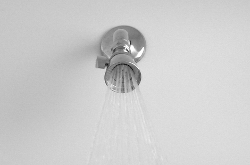샤워 꼭지에도 균이

We all/ have heard/ about harmful bacteria/ hiding/ in the home. Studies/ have discovered evidence of harmful bacteria/ in toilets, on surfaces/ where food is prepared, even on home telephones.
Recently, American researchers/ found harmful bacteria/ in a place/ most of us/ would never suspect. They found/ that the bathroom showerheads/ people use to wash up/ may be covering us/ with more than water.
The researchers/ used a molecular genetics test/ to examine fifty showerheads/ from nine American cities. Those showerheads/ came from homes and public places/ in Colorado, Illinois, New York, North Dakota and Tennessee.
Thirty percent/ of the devices/ had high levels/ of Mycobacterium avium, an organism/ linked to lung disease. The researchers say/ the bacteria/ were grouped together/ in a thin, but sticky area of cells/ on the inside of showerheads. They say/ the levels of Mycobacterium avium/ were one hundred times higher/ than that of normal household water. And, showerheads/ made of plastic/ seemed to have higher bacteria levels/ than metal ones.
One of the showerheads/ was cleaned/ with a bleach solution/ in an effort/ to destroy the bacteria. Bleach/ is often used/ as a whitening agent/ when washing clothes. Tests showed/ that instead of killing the bacteria, the bleach/ actually caused the bacteria levels/ to increase.
A report/ about the study/ appeared last month/ in the Proceedings of the National Academy of Sciences.
The lead writer/ of the report/ was Norman Pace/ of the University of Colorado/ at Boulder. Professor Pace/ has a warning/ for people/ who let water/ hit their face/ when they first turn on the shower. He says/ they probably are getting a full face/ of the unhealthy bacteria. He says/ the bacteria/ can also float around in the air/ and be easily pulled/ into the lungs.
The professor says/ earlier research/ at National Jewish Hospital/ in Denver/ supports this theory. The research suggested/ that increases/ in pulmonary infections/ in the United States/ may be linked to people/ taking more showers/ than traditional baths.
Signs of pulmonary disease/ caused by Mycobacterium avium/ can include shortness of breath, a continual dry cough, and feelings of tiredness or weakness.
The researchers say/ showers/ may not be a big problem/ for healthy people. But, they warn/ that persons/ with weakened defenses/ for fighting disease/ are at greater risk. This includes pregnant women, older adults and people with other diseases.

